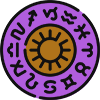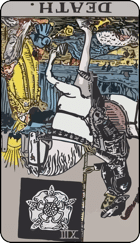Conversely, when the Death card appears in its reversed position, its meaning shifts dramatically. The shadowy undercurrents of resistance and stagnation become apparent, indicating an unwillingness to embrace change. A reversed Death card often points to an individual clinging to the past much like trying to move forward while dragging along a heavy anchor of old emotions, fears, or situations that inhibit growth.
Within the context of love, the reversed Death card highlights a reluctance to address necessary changes in a romantic relationship. Instead of welcoming transformation, partners may struggle with stagnation, leading to feelings of frustration and entrapment. This stagnation signifies an attachment to outdated patterns, which not only hinders personal growth but may also strain the bond between partners. Individuals may hold on to dysfunctional relationships out of fear of being alone, ironically debasing the possibility of a healthier connection elsewhere.
In terms of career, the reversed Death card presents a stark mirror to its upright counterpart. Here, individuals may sense dissatisfaction in their current roles yet resist the inevitable changes that must occur for growth. Rather than forging ahead, they cling to what is known, even if it no longer resonates with their ambitions. This resistance can stall career advancement and personal satisfaction, urging a deeper introspection to identify sources of fear and hesitation that hinder professional evolution.
Exploring finances through the lens of a reversed Death card reveals a clear message: avoid bottling up emotions or procrastinating necessary changes. This card prompts individuals to examine their financial strategies more closely. A reluctance to adapt one’s financial plan can lead to problematic outcomes. This closed-off energy may manifest as inability to reset financial priorities, either through unshared expenses or emotional spending. Recognizing the need for change in financial habits can foster the stability required for future success.
In the realm of health, the reversed Death card frequently suggests a stagnation in recovery or a fear that holds you back from meaningful healing. Individuals may cling to negative habits or resist the changes needed to promote better health. This resistance can stifle recovery and serve as a call to reflect on what is being held onto and why. Whether it is confronting a poor diet or neglecting mental health practices, potential for growth is stymied until one learns to let go of self-imposed barriers.
Finally, this card’s impact on spirituality reveals a struggle against transformation. The reversed Death card can signify a reluctance to release outdated beliefs or practices. Individuals may feel stagnant on their spiritual journey due to a fear of the unknown, which inhibits their growth and understanding. Emphasizing the need for honest self-reflection, this card encourages a closer examination of what spiritual practices need to be released for enlightenment to flourish.
Love
In matters of love, the reversed Death card speaks volumes about stagnation and emotional inertia. When it appears in readings, it often represents a relationship stuck in a cycle of lethargy and discontent. Partners might cling to old grievances, unwilling to address necessary transformations that could promote healthier dynamics. This card suggests that fears of abandonment or change can trap individuals in unfulfilling connections, resulting in frustration and feelings of isolation.
Singles may suffer similar fates due to the reversed card’s influence. It implies that releasing old patterns such as fears from past relationships is essential for growth. A reluctance to break free from these patterns may prevent new love from entering one’s life, trapping individuals in a cycle of past disappointments, much like a bird unable to leave the cage of its own making.
The reversed Death card encourages individuals to confront these fears, urging open communication and emotional honesty with partners. By facing the hard truths and being willing to transform relationships can evolve, breaking free from stagnation and inviting new beginnings.
Career
In career contexts, the reversed Death card highlights a refusal to embrace inevitable changes that could lead to personal and professional satisfaction. Stagnation is palpable, and this card reflects a growing dissatisfaction with one’s job, coupled with a fear of letting go. Often, individuals may find themselves clinging to outdated roles or responsibilities, unable to envision viable alternatives. This resistance hinders advancement and satisfaction, creating an undercurrent of frustration.
The reversed card serves as a caution within professional environments, indicating that the individual should not merely wait for a change to occur but take proactive steps towards transformative action. This could mean pursuing additional training, seeking mentorship, or even considering a complete career shift. Recognizing the need to face these issues head-on can lead to significant advancements in productivity and fulfillment.
Finances
When exploring finances, the reversed Death card draws attention to areas of imbalance and avoidance behaviors. It signals potential financial declines or unwise spending habits that are dragging individuals down. Instead of facing budgetary difficulties head-on, this card suggests the tendency to ignore pressing financial realities.
Individuals may hold on to unhealthy financial strategies out of fear of confronting truths about their situations. The reversed Death card invites a reality check requiring individuals to assess expenditures, invest wisely, and counter missed opportunities that could lead to improved stability.
Health
In the health sector, the reversed Death card embodies resistance and stagnation regarding health transformation. It suggests that without diligent commitment toward healthier choices, recovery may be significantly delayed. Individuals may cling to negative habits, resisting necessary changes that could lead to improved wellness.
The reversed position encourages a deep dive into one’s personal health regimen while urging individuals to reflect on their fear of change. By confronting these fears whether through diet, exercise, or mental health practices individuals can spark the transformation they desperately need.
Spirituality
The reversed Death card, viewed through a spiritual lens, marks an unwillingness to embrace the wheel of transformations that enrich our spiritual journeys. It suggests sticking to outdated beliefs or practices out of fear of the unknown. The card often uncovers a resistance to confronting deeper truths about oneself, which can inhibit spiritual growth.
To thrive spiritually, letting go of fears and outdated interpretations is critical. Engaging in self-reflection can lead to transformative journeys, highlighting the importance of approaching spirituality with an openness to reinvent oneself.

